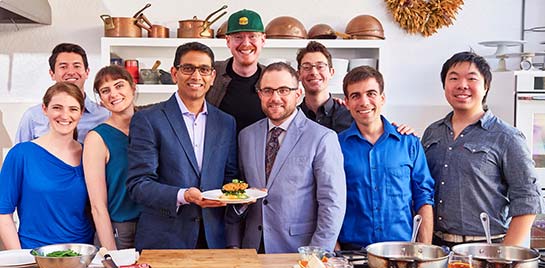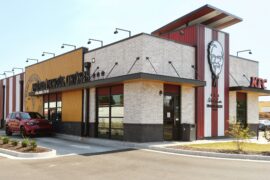Tyson Ventures, the venture capital arm of Springdale, Arkansas, USA-headquartered Tyson Foods, has taken a minority position in food technology startup Memphis Meats, a San Leandro, California-based innovator in cultured meat produced directly from animal cells.
 Memphis Meats-style Southern Fried ChickenThe deal, terms of which were not disclosed, sees the world’s second largest processor and marketer of chicken, beef and pork join a diverse group of investors in Memphis Meats that includes DFJ, Atomico, Cargill, Bill Gates and Richard Branson. By August of 2017, it had reportedly raised $17 million in Series A funding.
Memphis Meats-style Southern Fried ChickenThe deal, terms of which were not disclosed, sees the world’s second largest processor and marketer of chicken, beef and pork join a diverse group of investors in Memphis Meats that includes DFJ, Atomico, Cargill, Bill Gates and Richard Branson. By August of 2017, it had reportedly raised $17 million in Series A funding.
“We’re excited about this opportunity to broaden our exposure to innovative, new ways of producing meat, especially since global protein demand has been increasing at a steady rate,” said Justin Whitmore, Tyson’s executive vice president for corporate strategy and chief sustainability officer. “We continue to invest significantly in our traditional meat business, but also believe in exploring additional opportunities for growth that give consumers more choices.”
 “We are excited that Tyson Foods will be joining us in our mission to bring meat to the table in a sustainable, affordable and delicious way,” said Dr. Uma Valeti, co-founder and chief executive officer of Memphis Meats. “Our vision is for the world to eat what it loves, in a way that addresses today’s challenges for the environment, animal welfare and public health. We are accelerating our work and building out a world-class team to make this a reality.”
“We are excited that Tyson Foods will be joining us in our mission to bring meat to the table in a sustainable, affordable and delicious way,” said Dr. Uma Valeti, co-founder and chief executive officer of Memphis Meats. “Our vision is for the world to eat what it loves, in a way that addresses today’s challenges for the environment, animal welfare and public health. We are accelerating our work and building out a world-class team to make this a reality.”
The company’s stated goal, according to its website, is: “to change the way meat gets to your plate. We’re developing a way to produce real meat from animal cells, without the need to feed, breed and slaughter actual animals. We expect our products to be better for the environment (requiring up to 90% fewer greenhouse gas emissions, land and water than conventionally-produced meat), the animals and public health. And most importantly, they’re delicious.”
According to Wikipedia, the production cost of cultured beef had been $18,000 per pound ($40,000/kg), and the production cost of the cultured poultry was about $9,000 per pound ($20,000/kg). By June of 2017 Memphis Meats had reduced the cost of production to below $2,400 per pound ($5,280/kg), and anticipates that further cost reductions will lead to commercial release of its products by 2021.
CEO Valeti, a Mayo Clinic cardiologist by training, started the Memphis Meats venture with Nicholas Genovese and Will Clem in 2015. He sets the strategic direction and oversees development of clean meat technologies with a focus on commercialization as the company pursues a major technological leap in the near-trillion dollar global meat industry.
Genovese is a stem cell biologist, meat-lover and a vegetarian who believes that the best way to improve the world’s food system is by innovating cultured meat technologies that can produce the same quality of product to consume without incurring negative impact on the planet and its inhabitants. Prior to co-founding Memphis Meats, he raised poultry on his family’s farm, gained industrial experience as a bioprocess technician, completed his graduate thesis in cancer biology, and pioneered a novel approach for the cultivation of livestock stem cells.
Clem brings to the plate extensive knowledge and experience in both the science of clean or cultured meat as well as the foodservice industry. Having earned a PhD in biomedical engineering from the University of Alabama in Birmingham, he worked on bone engineering at a major orthopedic company. The BBQ pit master’s family owns a chain of 43 barbecue restaurants based out of Memphis, Tennessee. This has provided him with business experience in the foodservice industry and a long list of recipes for meat-based products, developed over a half-century by award-winning chefs.
 Memphis Meats Co-founders Uma Valeti, Nicholas Genovese and Will Clem (third, fourth and fifth from left, front row) are seen with key members of the team. The company grows meat in small quantities using cells from cows, pigs and chickens to make products that include hot dogs, sausages, burgers and meatballs.
Memphis Meats Co-founders Uma Valeti, Nicholas Genovese and Will Clem (third, fourth and fifth from left, front row) are seen with key members of the team. The company grows meat in small quantities using cells from cows, pigs and chickens to make products that include hot dogs, sausages, burgers and meatballs.





